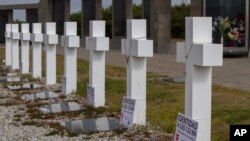Nobel peace laureate Adolfo Perez Esquivel and other Argentine human rights activists have visited a Falklands Islands cemetery ahead of planned efforts by Britain and Argentina to identify the remains of 123 Argentine soldiers buried after their 1982 war.
The two nations agreed last year to have a team of forensic experts from the International Committee of the Red Cross identify the remains. Esquivel, Nora Cortinas of the Mothers of Plaza de Mayo group and other activists visited Darwin Cemetery on Tuesday.
“For me it is all about looking to rebuild a bridge between the habitants of the islands and us, as human beings, as peoples. After all we have shared roots,” Perez Esquivel said.
Falklands or Malvinas?
Argentina lost a brief but bloody war with Britain after Argentine troops invaded the South Atlantic archipelago. Argentina still claims the islands, which it calls the Malvinas. Britain says the Falklands are a self-governing entity under its protection.
In all, the war claimed the lives of 649 Argentines and 255 British soldiers. The bodies of the Argentine war dead are expected to be exhumed from their individual graves in June so DNA samples can be taken. Some fear the identification could lead others to ask that the remains be moved to Argentina's mainland, though that is not part of the plan at this point.
“I think every one of the families has the right to decide where the bodies of their sons should finally rest,” Cortinas said. “We have to keep strengthening bonds among our communities and maintain respect among out peoples. In this case, this country has been colonized and we have to end with that colonization and let these people be free.”
Visit concerns islanders
Some islanders have already expressed concern about the visit, saying the Argentines ignore the wishes of the Falklands' 3,000 residents who have expressed a desire to remain British.
“They seem to be stuck with the idea that we are directly under colonial rule and in fact, they keep talking about our government, if they talk about our government at all, as a colonial government,” said John Fowler, a former editor of the islands' weekly newspaper, the Penguin News.
In a breakthrough after decades of tense relations, Argentina and Britain also agreed last year to lift some restrictions on the extraction of natural resources, shipping and fishing industries in the Falklands and increase the number of flights between the islands and South America.




